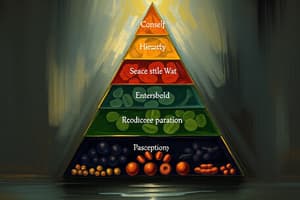Podcast
Questions and Answers
What is the correct formula for calculating simple interest?
What is the correct formula for calculating simple interest?
- I = Pni^n
- I = P * ni (correct)
- I = P + (n * i)
- I = P(1 + ni)
Which statement accurately describes compound interest?
Which statement accurately describes compound interest?
- It requires a constant interest rate throughout the investment period.
- It is calculated solely on the initial principal.
- It is only calculated annually on the principal amount.
- It is based on both the principal and the interest accrued over time. (correct)
In the context of future value, which variable represents the number of times interest is compounded per year?
In the context of future value, which variable represents the number of times interest is compounded per year?
- i
- P
- n (correct)
- t
If a loan's total cost is calculated, which of the following formulas is correct?
If a loan's total cost is calculated, which of the following formulas is correct?
What does the variable 't' signify in the future value calculation?
What does the variable 't' signify in the future value calculation?
What is the primary purpose of investigating accidents in a workplace?
What is the primary purpose of investigating accidents in a workplace?
Which of the following is NOT a reason for preventing accidents in the workplace?
Which of the following is NOT a reason for preventing accidents in the workplace?
According to the Domino Theory proposed by Heinrich, what role does the first factor play in an accident sequence?
According to the Domino Theory proposed by Heinrich, what role does the first factor play in an accident sequence?
Which of the following statements best describes an 'accident' as per the content?
Which of the following statements best describes an 'accident' as per the content?
What is a significant impact of accidents on employees in the workplace?
What is a significant impact of accidents on employees in the workplace?
What is one of the outcomes of preventing accidents in relation to financial management?
What is one of the outcomes of preventing accidents in relation to financial management?
What aspect of workplace safety does the Domino Theory emphasize?
What aspect of workplace safety does the Domino Theory emphasize?
Which factor is NOT considered part of worker load capacity factors?
Which factor is NOT considered part of worker load capacity factors?
What primarily contributes to accidents, according to human factors theory?
What primarily contributes to accidents, according to human factors theory?
Which of the following is associated with inappropriate activities in the workplace?
Which of the following is associated with inappropriate activities in the workplace?
Which aspect does NOT contribute to environmental overload?
Which aspect does NOT contribute to environmental overload?
Inappropriate worker response to hazards typically involves what action?
Inappropriate worker response to hazards typically involves what action?
Which of the following best describes the design process related to safety management?
Which of the following best describes the design process related to safety management?
What is the primary role of enforcement in a safety management system?
What is the primary role of enforcement in a safety management system?
Which factor is indicated as a result of environmental conditions impacting worker performance?
Which factor is indicated as a result of environmental conditions impacting worker performance?
Which aspect of a worker's state can lead to increased susceptibility to human error?
Which aspect of a worker's state can lead to increased susceptibility to human error?
What section typically follows the executive summary in an investigation report?
What section typically follows the executive summary in an investigation report?
Which component of the report focuses specifically on the cause and circumstances of the accident?
Which component of the report focuses specifically on the cause and circumstances of the accident?
In an investigation report, what does the conclusions and recommendations section typically aim to achieve?
In an investigation report, what does the conclusions and recommendations section typically aim to achieve?
Which part of the report would you expect to include a summary of the key points identified throughout the investigation?
Which part of the report would you expect to include a summary of the key points identified throughout the investigation?
What is the primary purpose of the background information section in an investigation report?
What is the primary purpose of the background information section in an investigation report?
Which section in the context of report writing typically contains detailed explanations of the methods used during the investigation?
Which section in the context of report writing typically contains detailed explanations of the methods used during the investigation?
What role does the table of contents play in the structure of an investigation report?
What role does the table of contents play in the structure of an investigation report?
Which section would likely contain a reflective overview of the accident and its implications?
Which section would likely contain a reflective overview of the accident and its implications?
What type of information is typically not found in the conclusions and recommendations section?
What type of information is typically not found in the conclusions and recommendations section?
What is essential for ensuring clarity in behavioral expectations?
What is essential for ensuring clarity in behavioral expectations?
Which factor is crucial in motivating individuals to behave appropriately?
Which factor is crucial in motivating individuals to behave appropriately?
How does managerial involvement contribute to behavioral change?
How does managerial involvement contribute to behavioral change?
What type of data is essential for making informed decisions regarding behavior management?
What type of data is essential for making informed decisions regarding behavior management?
What should be the focus of feedback provided to associates being observed?
What should be the focus of feedback provided to associates being observed?
What does the application of the scientific method in behavior management entail?
What does the application of the scientific method in behavior management entail?
In behavioral management, which of the following is a planned intervention?
In behavioral management, which of the following is a planned intervention?
What is a fundamental aspect of the modern causation model in safety management?
What is a fundamental aspect of the modern causation model in safety management?
What role does integration of information play in behavior management?
What role does integration of information play in behavior management?
Which of the following statements about safety assessments is true?
Which of the following statements about safety assessments is true?
Flashcards
Simple Interest
Simple Interest
The interest is calculated only on the original amount borrowed or invested.
Compound Interest
Compound Interest
The interest is calculated on both the principal and accumulated interest from previous periods.
Future Value
Future Value
The total amount of money that will be received at the end of the investment period.
Principal
Principal
Signup and view all the flashcards
Interest Rate
Interest Rate
Signup and view all the flashcards
Domino Theory of Accident Causation
Domino Theory of Accident Causation
Signup and view all the flashcards
3 Es Controls
3 Es Controls
Signup and view all the flashcards
Accident
Accident
Signup and view all the flashcards
Employee Latitude (in Work)
Employee Latitude (in Work)
Signup and view all the flashcards
Preventing Future Occurrences
Preventing Future Occurrences
Signup and view all the flashcards
Accident Investigation
Accident Investigation
Signup and view all the flashcards
Safe and Healthy Work Environment
Safe and Healthy Work Environment
Signup and view all the flashcards
Executive Summary
Executive Summary
Signup and view all the flashcards
Narrative
Narrative
Signup and view all the flashcards
Background Information
Background Information
Signup and view all the flashcards
Analysis of the Accident
Analysis of the Accident
Signup and view all the flashcards
Recommendations
Recommendations
Signup and view all the flashcards
Table of Contents
Table of Contents
Signup and view all the flashcards
Account of the Accident
Account of the Accident
Signup and view all the flashcards
Conclusions
Conclusions
Signup and view all the flashcards
Summary
Summary
Signup and view all the flashcards
Title Page
Title Page
Signup and view all the flashcards
Environment
Environment
Signup and view all the flashcards
Design Process
Design Process
Signup and view all the flashcards
Process Change Management
Process Change Management
Signup and view all the flashcards
Training
Training
Signup and view all the flashcards
Human Factors
Human Factors
Signup and view all the flashcards
Worker Load Capacity
Worker Load Capacity
Signup and view all the flashcards
Enforcement
Enforcement
Signup and view all the flashcards
Standard Operating Procedures (SOPs)
Standard Operating Procedures (SOPs)
Signup and view all the flashcards
Point of Attack
Point of Attack
Signup and view all the flashcards
Managerial Involvement
Managerial Involvement
Signup and view all the flashcards
Motivation for Safe Behavior
Motivation for Safe Behavior
Signup and view all the flashcards
Clear Expectations for Safe Behavior
Clear Expectations for Safe Behavior
Signup and view all the flashcards
Safety Assessments
Safety Assessments
Signup and view all the flashcards
Observational Data Collection
Observational Data Collection
Signup and view all the flashcards
Scientific Method in Safety
Scientific Method in Safety
Signup and view all the flashcards
Integration of Safety Information
Integration of Safety Information
Signup and view all the flashcards
Feedback on Safety Performance
Feedback on Safety Performance
Signup and view all the flashcards
Review and Evaluation of Safety Interventions
Review and Evaluation of Safety Interventions
Signup and view all the flashcards
Planned Safety Interventions
Planned Safety Interventions
Signup and view all the flashcards
Study Notes
Domain 2 Management System
- Domain 2 represents 13.34% of the total content.
Management Theories
- Maslow's Hierarchy of Needs proposes that human motivation stems from unsatisfied needs.
- Lower-level needs (physiological, safety, love/belonging, esteem) must be met before higher-level needs (self-actualization) can motivate.
- Once a lower-level need is satisfied, it no longer serves as a motivator.
McGregor's Theory X and Theory Y
- Theory X: Employees are motivated primarily by monetary rewards and security.
- Theory Y: Employees are motivated by esteem and self-actualization needs.
Herzberg Motivational Theory
- Hygiene factors: Supervision, interpersonal relationships, salary, physical working conditions. Rarely cited as motivators.
- Motivation factors: Achievement, advancement, recognition, responsibility. Motivators.
Management By Objectives (MBO)
- MBO involves agreeing on objectives within an organization.
- Managers and employees agree on objectives and understand them within the organization.
- Doing so helps achieve employee personal goals and positively impacts organizational success.
Contingency Theory
- Claims that there is no single best way to organize a corporation, lead a company or make decisions.
Systems Theory
- Interdisciplinary theory about complex systems.
- Frameworks for investigating or describing groups of interconnected objects producing a result.
Chaos Theory
- Branch of mathematics, physics, and philosophy.
- Studies the behaviors of dynamical systems that are very sensitive to initial conditions.
Management Styles
- Autocratic leader/manager makes all decisions unilaterally.
- Directive Democrat Leader allows participation in decision-making but closely supervises employees.
- Directive Autocrat Leader makes decisions unilaterally and closely supervises employees.
- Permissive Democrat Leader allows employees to participate in decision making and gives subordinates some latitude.
- Permissive Autocrat Leader makes decisions unilaterally but gives employees latitude in carrying out the work.
Accident Causation and Investigation Techniques
- Domino Theory: An accident is one factor in a sequence that may lead to injury.
- 3 E controls: Engineering, education, and enforcement.
- Accident is any unplanned, uncontrolled event that results in personal injury or property damage.
Human Factors Theory
- Accidents are entirely the result of human error.
- Overload occurs when work tasks are beyond worker capability.
- Inappropriate Worker Response includes errors and ignoring safe working procedures.
Accident/Incident Theory (Petersen)
- Overload (Pressure): stress from pressure, fatigue and motivation.
- Ergonomic traps: incompatible workstations (size, force, reach, feel) and incompatible expectations.
- Human error: errors by an individual.
- System failure: policy, responsibility, training, inspection, correction, and standards.
Epidemiological Theory
- Focuses on the relationship between industrial hygiene and environmental factors causing disease.
Systems Theory
- Man, liveware, machine, and surroundings are interconnected which contribute to or prevent accident conditions.
Energy Release Theory
- Techniques to reduce accidents include preventing energy buildup, reducing the initial amount of energy, preventing energy release, controlling energy release, and separating the energy from the living or nonliving object.
Behavior-Based Safety (BBS)
- A multistage process leading to observation, feedback, and continuous improvement.
- Elements: Identification of behaviors affecting safety, defining behaviors, implementing mechanisms for measuring behaviors, providing feedback, and reinforcing positive progress.
Modern Causation Model
- Injury or damage can range from no damage to severe damage.
- The model includes operating system errors, systems defects, safety program defects, and safety management errors
Accident Investigation Techniques
- Primary purpose to prevent recurrence of the same accident.
- Useful information can be acquired from witnesses, reports, and observations, and an analysis of operating procedures.
- Interview witnesses as soon as possible after the accident, addressing the purpose of the investigation and putting the witness at ease
Problem-Solving Techniques
- The scientific method: making observations, developing hypotheses, testing the hypotheses, and formulating hypotheses.
- Principles: agreement, differences, and concomitant variation.
Management Oversight and Risk Tree (MORT)
- A diagram and process to help identify and assess risks associated with an operation and avoid oversights/omissions
Gross Hazard Analysis (GHA)
- A "gross" hazard analysis that requires further study, often in the form of a logic diagram or table. Useful in the early stages of an accident investigation to support hypothesis development about issues and situations that led to the accident(s).
Failure Modes and Effects Analysis (FMEA)
- A technique to determine where failures have occurred in the process.
Fault Tree Analysis
- A Boolean logic diagram depicting the pathways within a system that can lead to a negative outcome or a failure.
Multilinear Event Sequencing (MES)
- An integrated approach to investigate and analyze a wide range of events, both desired and undesired, before or after they happen.
Report of Investigation
- Includes a cover page, title page, table of contents, executive summary, narrative (body), conclusions and recommendations
Measuring Health and Safety Performance
- To manage health and safety, measure it.
Elements of Effective Accountability
- Stakeholders need to know,
- Reporting is essential,
- And results are important.
Studying That Suits You
Use AI to generate personalized quizzes and flashcards to suit your learning preferences.
Related Documents
Description
Test your understanding of key management theories including Maslow's Hierarchy of Needs, McGregor's Theory X and Y, and Herzberg's Motivational Theory. Explore how these theories explain employee motivation and management strategies. Perfect for students of management or anyone interested in organizational behavior.




